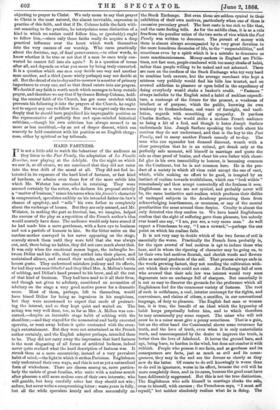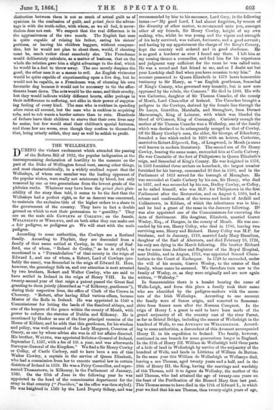HARD FASTNESS: TT is not a little odd to watch
the behaviour of the audience as they listen to the Fast Family, the adaptation of La Famine Benoiton, now playing at the Adelphi. On the night on which we saw it, at all events, we are convinced that they did not enter into the true drift of the moral at all. They did not feel in- terested in its exposure of the hard kind of fastness, or fast kind of hardness, or admire even those few of the more subtle hits -which Mr. Webster has succeeded in retaining. They were Amused certainly by the suitor, who declares his proposal strictly a "matter of business," raises his terms when his fiancée's character is compromised, speculates audibly on his intended father-in-law's chance of apoplexy, and " sells " his own father so completely about the exchange of houses. But they are only amused, and Mr. Webster, in making the part so farcical, has, we imagine, helped the success of the play as a repetition of the French author's idea would scarcely have done. The audience would only have stared if he had made him a mere gentleman, with a keen eye to business and not a particle of humour in him. So the bitter satire on the careless mother conveyed in her never appearing on the stage, scarcely struck them until they were told that she was always out, and, there being no babies, they did not care much about that. It was only when the emotional scenes began, the imbroglio be- tween Didier and his wife, that they settled into their places, and maintained silence, and craned their necks, and applauded with honest gusto. They understood mistaken jealousy and its effects, for had they not seen Othello? and they liked Mrs. A. Mellon's bursts of sobbing, and Didier's hand pressed to his brow, and all the rest of that kind of business. They had been used to it all their lives, and though not given to adultery, considered an accusation of adultery on the stage a very good motive power for a dramatic scene. Most of them, perhaps, left to themselves, would have hissed Dither for being so ingenious in his suspicions, but they were accustomed to expect that mode of protract- ing the interest, and so they kept quiet and waited on. The acting was very well done, too, as far as Mrs. A. Mellon was con- cerned,—despite an incurable stage habit of sobbing with the shoulders ;—and they stayed for the nonsensical and badly executed operetta, or went away before it quite contented with the even- ing's entertainment. But they were not entertained as the French author certainly, and the English adapter perhaps, intended them to be. They did not carry away the impression that hard fastness is the most disgusting of all forms of artificial badness, indeed never quite realized what the hard description of fastness was. It struck them as a mere eccentricity, instead of a very prevalent habit of mind,—the light in which it strikes Parisians. Englishmen only understand their own ways, and this is not as yet a naturalized form of wickedness. There are classes among us, more particu- larly the cadets of great families, who unite with a zealous search after pleasure a still more zealous care of their own interests; who will gamble, but keep carefully sober lest they should not win ; seduce, but never write a compromising letter ; waste years in folly, but all the while speculate keenly and often successfully on the Stock Exchange. But even these are seldom cynical in their exhibition of theii own motives, particularly when one of them is excessive pecuniary greed. The best caste is too rich to like that, mad the caste feeling tells. As for the middle class, it is as a rule free from the peculiar union of the two sorts of vice which the Fast
Family was written to denounce. The pursuit of money with them is almost always accompanied by a very great devotion to the more humdrum decencies of life, to the " respectabilities," and sometimes even by a spirit which it is a mistake to denounce as mere sanctimoniousness. Money-seekers in England are Philis- tines, not fast men, people cumbered with too many cloaks of habik rather than people willing to be naked and not ashamed. There are men on the confines of the Stock Exchange who try very hard to combine both careers, but the average merchant who kept a mistress very publicly would find his bills less trusted, and an avowed addiction to pleasure or open belief in the expediency of doing everybody would shake a banker's credit. " Fastness " always includes to the English mind a habit of reckless expendi- ture, a contempt of the future for the present, a weakness of intellect or of purpose, which the public, knowing its own tendency to freehandeduess, and want of foresight, and vacil- lation, regards with something of sympathy. It pardons Charles Surface, who would strike a modern French audience as being a bit of a fool, and though it hates Joseph Surface understands him. Joseph Surface speaking the truth about his motives they do not understand, and that is the key to the- Fast Family, and to many another French comedy of to-day. The man who can squander but demand discount, wench with a clear perception that he is an animal, get drunk only at the perfectly safe moment, sell himself in marriage and quote the sale as clear proof of brains, and cheat his own father with cheer- ful glee in his own insensibility to honour, is becoming common on the Continent, but he is not common here. He is the pro- duct of a society in which all vices exist except the one of cant, which, while making no effort to be good, is tempted by an instinct of realism towards truthfulness, which can "look within" remorselessly and then accept contentedly all the foulness it sees. Englishmen as a race are not cynical, and probably never will be, the same instinctive anti-realism which produces their dislike of undraped subjects in the Academy protecting them from acknowledging heartlessness, or meanness, or any of the mental peculiarities the mass around them despise. Cruelty is almost the only detested vice they confess to. We have heard Englishmen confess that the sight of suffering gave them pleasure, but nobody ever heard one say, "I am, you see, a very mean man." As well expect a Frenchman to say, "I am a coward,"—perhaps the one point on which his realism fails.
It is not very easy to decide which of the two forms of evil is essentially the worse. Practically the French form probably is, for the open avowal of bad motives is apt to induce those who hear, and in whom the ripening of character may be going on, to let their own bad motives flourish, and cherish weeds and flowers alike as natural products of the soil. That process always ends in the weeds growing fastest, they not needing the cultivation with- out which their rivals could not exist. An Exchange full of men who avowed that their sole law was interest would very soon degenerate into an exchange full of sharpers. But essentially it is not so easy to discover the grounds for the preference which all Englishmen feel for the commoner variety of fastness. The root of each is selfishness, a cool, interior contempt for the rights, and convenience, and claims of others, a sacrifice, in our conventional language, of duty to pleasure. The English fast man or woman has, it is true, the benefit of an ideal which the hypocrisy of habit keeps perpetually before him, and to which therefore he may occasionally pay some respect. The miser who will not avow he is a miser must give a penny sometimes. That is a gain, but on the other hand the Continental shows some reverence for truth, and the love of truth, even when it is only materialistic truth, and unaccompanied by the desire to improve the truth, is better than the love of falsehood. It leaves the ground bare, and apt, being bare, to harden in the wind, but does not cumber it with rubbish. People who possess it see facts, and as goodness and its consequences are facts, just as much as evil and its conse- quences, they may in the end see the former as clearly as they now do the latter. Of course to do evil knowingly is worse than to do evil in ignorance, worse in its effect, because the evil will be more completely done, and in its cause, because the good must have been deliberately suppressed. But this is not the true distinction. The Englishman who sells himself in marriage cloaks the sale, even to himself, with excuses ; the Frenchmen says, "I must sell myself," but neither absolutely realizes what he is doing. The distinction between them is not so much of actual guilt as of cynicism in the confession of guilt, and primii facie the advan- tage is with the truth-teller, with whom, as we all feel, it never- theless does not rest. We suspect that the real difference is in the aggressiveness of the two moods. The English fast man is quite capable of ruining his father, eating his sisters' portions, or leaving his children beggars, without compunc- tion, but he would not plan to cheat them, would, if cheating must be, much rather cheat somebody else. The Frenchman would deliberately calculate, as a matter of business, that on the whole the relation gave him a slight advantage in the deal, which he would be a fool to throw away. The one merely despises the good, the other uses it as a means to evil. An English vivisector would be quite capable of experimenting upon a live dog, but he would not be capable, as a Frenchman was, of choosing his own favourite dog because it would not be necessary to tie the affec- tionate beast down. The acts would be the same, and their cruelty, but they would indicate widely different hearts, alike perhaps in their indifference to suffering, not alike in their power of suppres- ing feeling of every kind. The man who is reckless in spending often ruins all around, but the man who is reckless in acquiring robs, and to rob wants a harder nature than to ruin. Hundreds of fathers leave their children to starve that their own lives may be easier, but few would steal their children's special fortunes, and those few are worse, even though they confess to themselves that, being utterly selfish, they may as well be selfish to profit.































 Previous page
Previous page